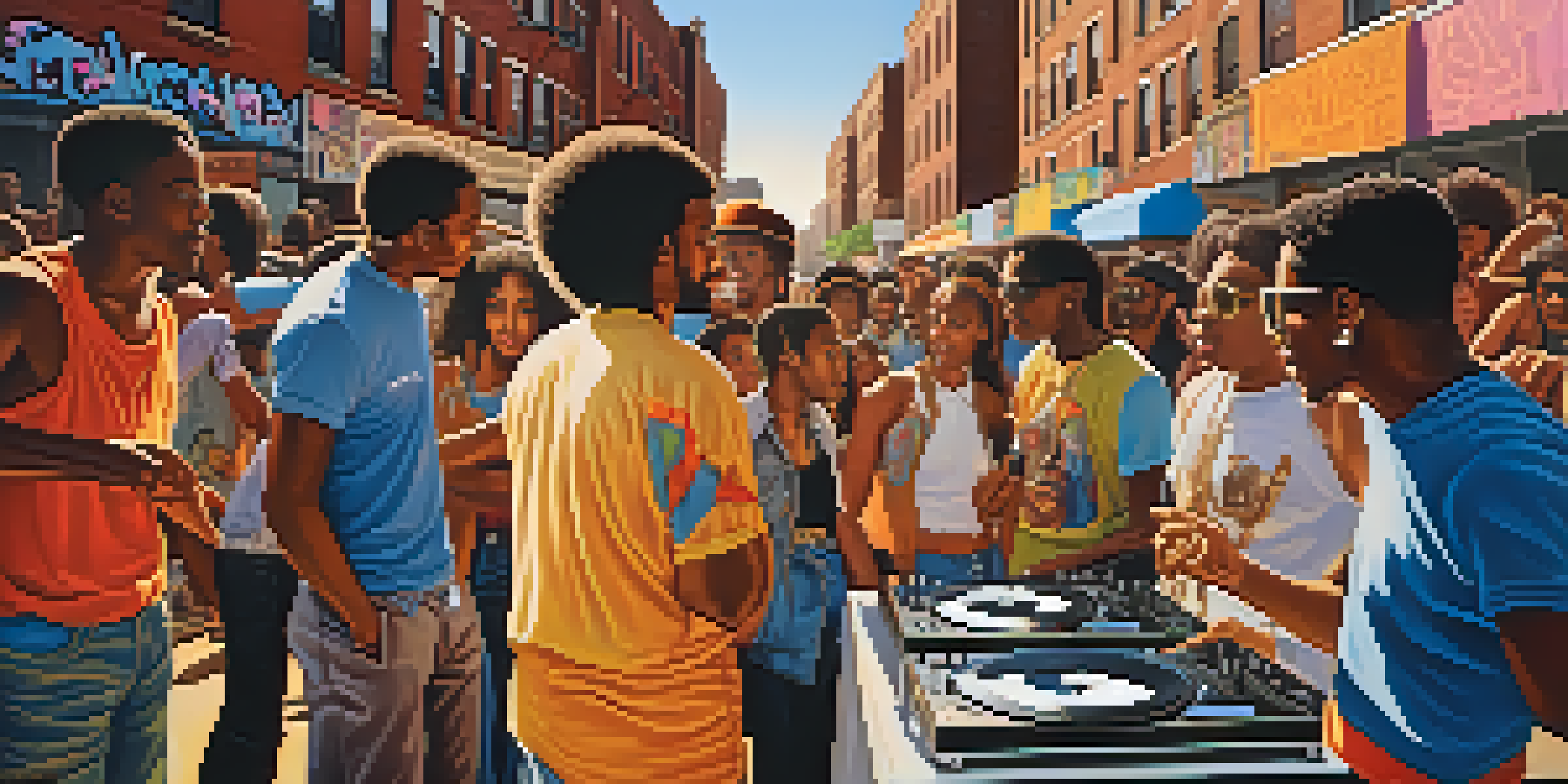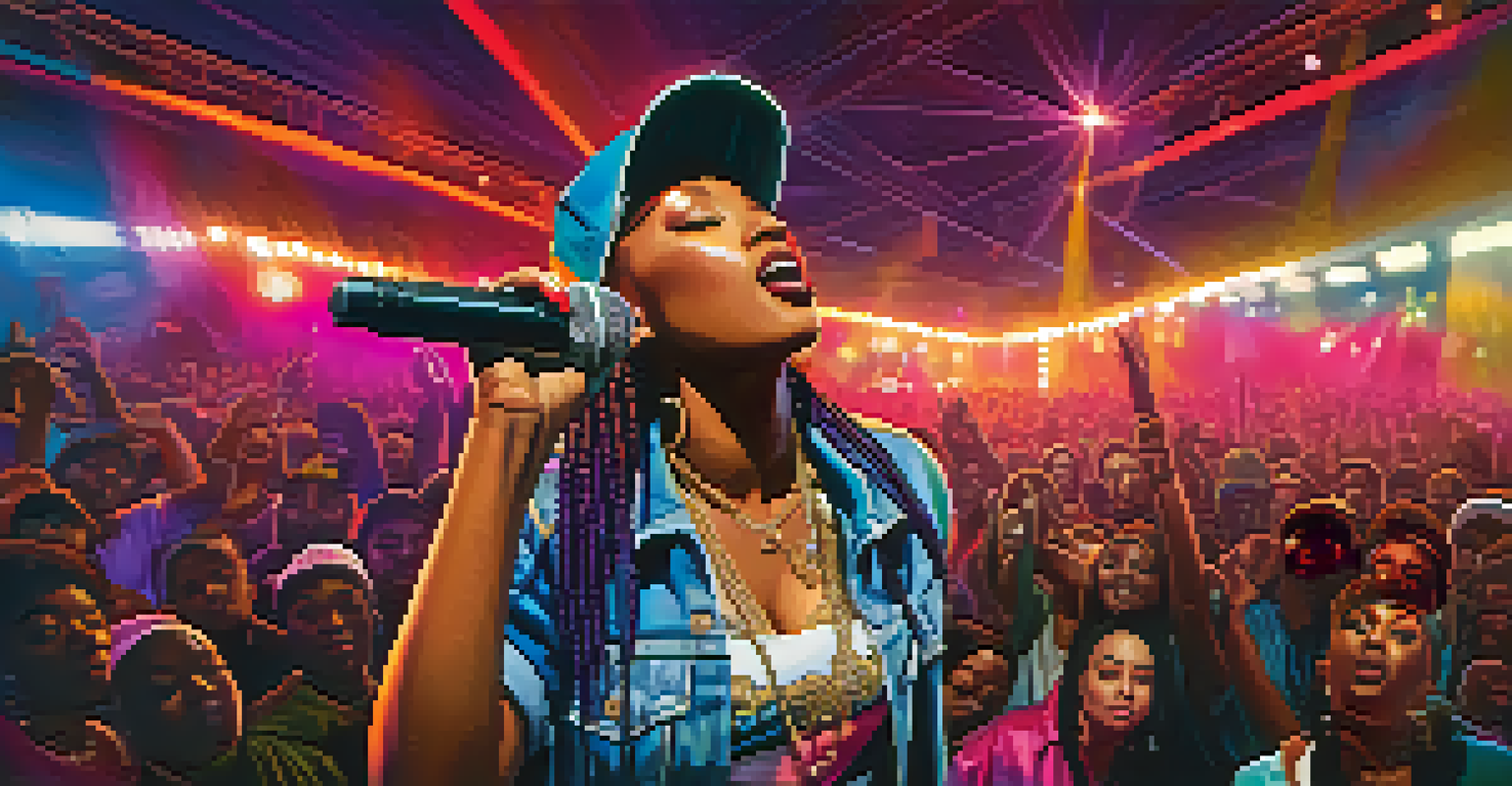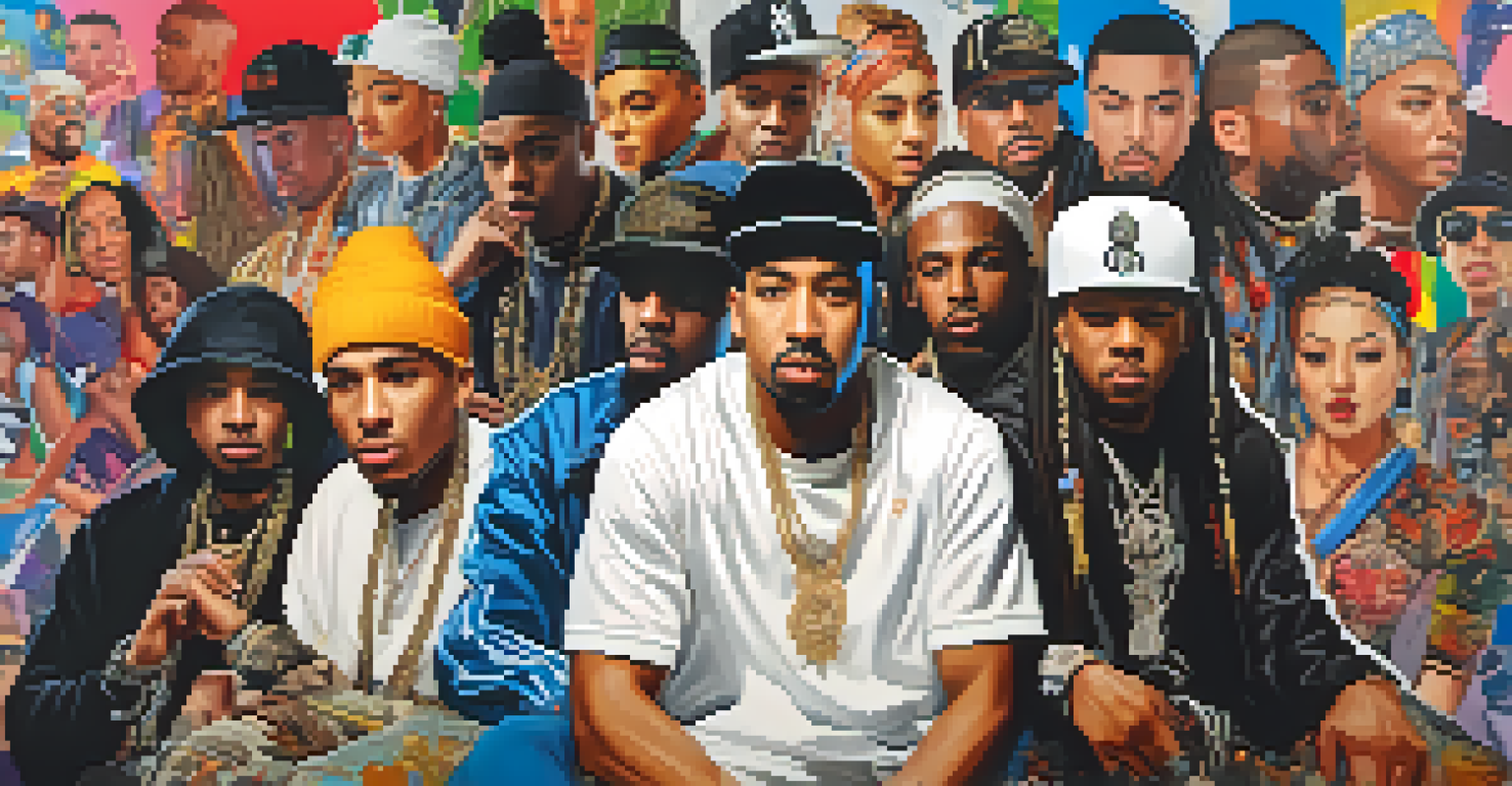The Birth of Hip-Hop: Social Change through Music in NYC

The Roots of Hip-Hop: A Cultural Melting Pot
Hip-hop originated in the 1970s in the South Bronx, a neighborhood marked by economic struggles and social unrest. It drew influences from various musical styles, including funk, soul, and reggae, creating a unique sound that resonated with the youth. This eclectic mix became a voice for marginalized communities, reflecting their realities and aspirations. As block parties and DJ competitions took off, hip-hop began to capture the attention of a broader audience, setting the stage for its cultural revolution.
Hip-hop is the voice of the people. It embraces the struggles and triumphs of everyday life.
The creativity of early hip-hop artists was fueled by their environment. They transformed everyday experiences and struggles into art, making their stories relatable and inspiring. For instance, DJ Kool Herc’s innovative use of breakbeats at parties allowed dancers and rappers to showcase their skills, fostering a sense of community and identity. This grassroots movement not only entertained but also empowered individuals to express themselves and address social issues.
As hip-hop grew, it embraced various elements, including graffiti art and breakdancing, further solidifying its status as a multifaceted cultural force. This combination of music, dance, and visual art created a vibrant scene that attracted diverse participants, from aspiring artists to social activists. The energy of this cultural melting pot laid the groundwork for hip-hop's evolution and its role as a catalyst for social change.
The Message: Addressing Social Issues through Lyrics
As hip-hop gained popularity, artists began to use their platform to tackle pressing social issues. Tracks like Grandmaster Flash and the Furious Five's 'The Message' highlighted the struggles of urban life, bringing attention to poverty, crime, and systemic inequality. These lyrics resonated deeply with listeners, sparking conversations about the realities faced by communities of color. Hip-hop became more than just music; it evolved into a powerful medium for social commentary.

Through storytelling and poignant lyrics, hip-hop artists shed light on injustices and encouraged listeners to reflect on their own circumstances. The genre's raw honesty provided an outlet for frustration and hope, inspiring movements for change. For example, artists like Public Enemy used their music to challenge authority and promote black empowerment, creating a sense of solidarity among fans. This activism through art helped to amplify voices that had long been silenced.
Hip-Hop: A Voice for the Marginalized
Originating in the South Bronx, hip-hop emerged as a powerful medium for marginalized communities to express their struggles and aspirations.
Moreover, hip-hop’s ability to cross cultural boundaries allowed it to address universal themes of struggle and resilience. As artists from diverse backgrounds began to share their experiences, the genre fostered a sense of community and understanding. This exchange of ideas not only enriched hip-hop but also encouraged listeners to confront societal issues, making it a vital part of the dialogue surrounding social change.
Women in Hip-Hop: Pioneers of Change
While often overshadowed, women have played a crucial role in the development of hip-hop. Pioneers like MC Lyte and Queen Latifah broke through gender barriers, proving that women could command the stage and deliver powerful messages. Their contributions not only expanded the genre but also challenged societal norms about femininity and strength. By sharing their stories, these artists inspired a new generation of female rappers to assert their voices in a male-dominated industry.
The art of storytelling is what hip-hop is all about. It’s about the narrative, the pain, and the triumph.
As hip-hop evolved, female artists continued to push back against stereotypes, using their music to explore themes of empowerment and self-identity. For instance, Missy Elliott’s innovative style and lyrics redefined what it meant to be a woman in hip-hop, showcasing confidence and creativity. This shift in representation allowed listeners to see women as multifaceted individuals, capable of addressing both personal and societal issues through their art.
The rise of female artists in the 1990s and 2000s marked a significant turning point in hip-hop culture. As they gained recognition, these women opened doors for others, fostering a more inclusive environment within the genre. This movement has led to a flourishing community of female rappers today, each contributing to the ongoing narrative of social change through their unique perspectives and experiences.
Global Influence: Hip-Hop as a Universal Language
As hip-hop spread beyond the borders of the United States, it transformed into a global phenomenon. Artists from around the world began to adopt and adapt the genre, infusing their unique cultural experiences and perspectives. This cross-cultural exchange not only enriched hip-hop but also highlighted its ability to resonate with diverse audiences. From France to Japan, hip-hop became a vehicle for expressing local struggles and aspirations, showcasing how music can unite people across continents.
In many countries, hip-hop emerged as a response to political and social issues, similar to its origins in NYC. For example, in Brazil, artists used the genre to address poverty and corruption, while in South Africa, it became a platform for anti-apartheid activism. These examples illustrate how hip-hop serves as a mirror reflecting the challenges faced by various societies. The genre's adaptability allows it to remain relevant and impactful, regardless of location.
Social Issues Addressed in Lyrics
Hip-hop artists have consistently used their platform to highlight social issues, sparking important conversations about inequality and justice.
Moreover, the global reach of hip-hop has fostered collaborations among artists from different backgrounds, resulting in unique sounds and styles. This blending of cultures creates a rich tapestry of music that transcends language barriers, proving that hip-hop is indeed a universal language. As the genre continues to evolve, it remains a powerful tool for social change, encouraging conversations that challenge the status quo and inspire future generations.
The Role of Media: Shaping Hip-Hop's Narrative
The media has played a significant role in shaping the narrative of hip-hop since its inception. Early television shows and radio stations helped introduce the genre to wider audiences, highlighting emerging artists and their messages. However, the portrayal of hip-hop in the media has often been mixed, sometimes emphasizing negative stereotypes while overlooking the positive social impact of the genre. This duality highlights the need for a more nuanced understanding of hip-hop's significance in society.
As social media platforms gained popularity, they transformed the way artists connect with fans and share their stories. Platforms like Instagram and TikTok have allowed for more direct communication, enabling artists to address social issues and engage with their audience in real-time. This shift has empowered artists to shape their own narratives, challenging traditional media portrayals and promoting a more authentic representation of hip-hop culture.
Additionally, the rise of independent labels and artists has further diversified the hip-hop landscape. With fewer gatekeepers, more voices can be heard, allowing for a broader range of experiences and perspectives. This democratization of hip-hop has led to an even richer dialogue surrounding social change, as artists continue to push boundaries and inspire conversations about their communities and the world.
Hip-Hop Today: A Continued Force for Change
Today, hip-hop remains a powerful force for social change, with artists using their influence to advocate for various causes. From raising awareness about police brutality to promoting mental health, contemporary hip-hop artists engage with critical issues that affect their communities. For instance, tracks by artists like Kendrick Lamar and J. Cole not only entertain but also provoke thought and inspire action among listeners. This commitment to social justice reflects hip-hop's roots as a vehicle for change.
Moreover, hip-hop's global presence continues to grow, with artists from different cultures contributing to the genre's evolution. This diversification enriches the conversation around social issues, as artists share their unique experiences and perspectives. By collaborating and supporting one another, these artists create a united front, amplifying their messages and encouraging collective action. This sense of solidarity is vital in the ongoing fight for social justice.
Women Pioneering Hip-Hop Culture
Female artists like MC Lyte and Queen Latifah have played a crucial role in reshaping hip-hop, breaking gender barriers and inspiring a new generation of voices.
As hip-hop looks to the future, its potential for social change remains vast. With new artists emerging and established figures continuing to push boundaries, the genre will undoubtedly adapt and respond to the ever-evolving social landscape. As a cultural movement, hip-hop has the power to inspire, unite, and drive meaningful change, making it a vital part of the contemporary social fabric.
The Legacy of Hip-Hop: Inspiring Future Generations
The legacy of hip-hop is one of resilience, creativity, and social change. Its journey from the streets of the Bronx to a global phenomenon showcases the power of music as a tool for expression and activism. Today, hip-hop continues to influence countless artists and movements, inspiring future generations to use their voices for change. This enduring impact highlights the significance of hip-hop in shaping cultural narratives and challenging societal norms.
As new artists emerge, they build upon the foundations laid by their predecessors, weaving their stories into the rich tapestry of hip-hop culture. This generational dialogue fosters a sense of continuity and connection, allowing artists to learn from one another while addressing contemporary issues. The collaboration between seasoned veterans and fresh talent ensures that the spirit of hip-hop remains vibrant and relevant.

Ultimately, the story of hip-hop is a testament to the power of community, creativity, and social justice. Its ability to adapt and respond to the needs of society ensures that it will continue to be a force for positive change. As we celebrate the contributions of hip-hop artists, we must also recognize their role in shaping a more equitable world, inspiring future generations to raise their voices and make a difference.